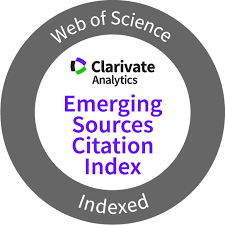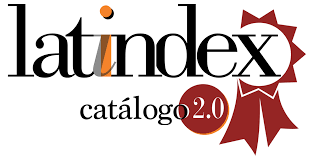About the Journal
Presentation
The International Journal of Public Relations is an international scientific journal for the dissemination of research in Public Relations and Communication open to the entire community of researchers, teachers, professionals and those interested in our field of study. Our main objective is to contribute to the dissemination of scientific and quality work. To this end, the journal relies on the collaboration of recognised experts in the field and demanding quality criteria; likewise, the editorial policy of open and free access allows the transfer of knowledge not only to the academic world, but also to society in general.
The journal hosts original research papers from the academic and professional world, monographic issues, book reviews and advertisements, with the aim of bringing Public Relations and Communication professionals information on trends and the current research landscape in the discipline.
The journal offers value-added services, such as alerts, hypertext links, management of the entire editorial process through the platform, both for authors and reviewers, as well as the possibility of customising the body of the text in its online version. There will be no cost for authors to publish their articles and/or reviews in the International Journal of Public Relations. Access and registration are free of charge.
The journal is included in the Emerging Sources Citation Index (WOS), Latindex Catalogue, DICE, RESH, CIRC, ISOC, Dialnet Metrics, ULRICH, EBSCO, DOAJ, REBIU, MIAR and continues working to position itself in the best indexes and databases.
History
The International Journal of Public Relations was born thanks to the impetus and effort of the Institute of Public Relations Research (IIRP), promoted by professionals and teachers of Public Relations and Communication at the University of Malaga (Spain). The journal aims to respond to the Institute's objective of "disseminating knowledge of Public Relations among researchers, teachers, professionals, the media and society in general".
Aims and scope
Revista Internacional de Relaciones Públicas (International Journal of Public Relations), edited and sponsored by Instituto de Investigación en Relaciones Públicas, is an online and biannual journal. Our publication was born in order to contribute to the dissemination of scientific knowledge of Public Relations among researchers, professionals, lecturers, media and society in general, as well as to create a common space for exchange and debate on Public Relations.
Our main research areas are organizational communication, communication offices, political communication, communication and new technologies, research and evaluation, social responsibility, tourism communication, conflict management, crisis communication international public relations, ... and other fields of action of Public Relations. We accept unpublished and original papers in the aforementioned topics. Likewise, reviews of books of interest to the scientific community are accepted.
The journal is aimed at an audience made up of researchers, lecturers and professionals in Public Relations and Communication with international scope and participation. Articles are accepted in four languages: Spanish, Portuguese, French and English. The scope therefore of this publication is international.
Ethics
The International Journal of Public Relations adopts the international guidelines on ethical standards to avoid bad scientific practices (malpractice). To do this, we stablish ethical criteria for the authors, the evaluators and the editors, according to criteria established by
- Committee on Publication Ethics (COPE) https://publicationethics.org/
- Wiley's Best Practice Guidelines on Publishing Ethics A Publisher's Perspective, Second Edition https://authorservices.wiley.com/ethics-guidelines/index.html.
The Code of Ethics of the International Journal of Public Relations can be consulted under the "Ética" ethic section.
Peer Review Process
The peer review process followed is double-blind peer review, there are two reviewers for each article and in case of disparity, the article will be reviewed by a third reviewer. This process will be conducted using the journal platform and it applies the reviewing protocol established by Revista Internacional de Relaciones Públicas, by means of the reviewer’s form (available on the web). We count on methodological reviewers, as well as with style correctors and text reviewers in English, French and Portuguese. In any case, the evaluators will be external to the publication.
The average manuscript revision period is 3 months from the reception of the article (this period may be extended if a third review is required). Authors will receive the anonymous evaluation reports. Likewise, the articles accepted for publication will be sent to the authors for correction and subsequent, they will return it to the journal for later publication. The peer-review process is a procedure that helps the editors to make decisions regarding the proposed manuscripts and allows the authors to improve their contributions.
Authors may, when submitting their proposal, suggest names of possible reviewers in "Comments to the editor". It is published two issues each year: the first, in the last half of June, and the second, in the last fortnight of December.
Open Access Policy
This journal provides immediate free access to its content under the principle of making research available to the public free of charge, which fosters a greater exchange of global knowledge.
Ethics
Code of Ethics
The International Journal of Public Relations adopts the international guidelines on ethical standards to avoid prejudicial scientific practices (malpractice). In order to comply with the highest standards, the journal establishes ethical criteria for authors, evaluators and editors, in accordance with the following bodies:
- Committee on Publication Ethics (COPE): https://publicationethics.org/
- Wiley's Best Practice Guidelines on Publishing Ethics: a Publisher's Perspective. Second Edition, available at: https://authorservices.wiley.com/ethics-guidelines/index.html
1. Editorial Board
- The journal counts with Advisory Board, Editorial Board, and Board of Management. All committees comprise the renowned members in the field of international Public Relations.
- The list with all the names can be found under the section “Equipo Editorial” (Editorial Board) and can be consulted under the following link: http://revistarelacionespublicas.uma.es/index.php/revrrpp/about/editorialTeam.
2. Authors and authors’ responsibilities
- The International Journal of Public Relations (Revista Internacional de Relaciones Públicas) does not charge any publishing fee to its authors. Publishing paper in the present journal is free of charge.
- Authors are obligated to indicate any funding obtained from agencies/projects from which the research article arises.
- All manuscripts shall follow a peer-review process.
- All authors included in the article should have made a significant contribution to the work.
- The authors guarantee that all individuals who have made a significant contribution to the work are included in the authorship.
- When authors identify a significant error or inaccuracy in their publication, they shall promptly inform the editors and provide them with the information required to list the relevant corrections and thus remedy the error.
- The authors guarantee that they have revised the most up-to-date and relevant literature about the subject matter. Likewise, authors should always provide the correct indication of the sources and contributions mentioned in the article.
- It is not allowed to publish the articles that repeat the same research and results in more than one scientific journal. The authors of the manuscripts should guarantee that the submitted work is original and that the manuscripts do not contain extracts or fragments from any written works already published. The authors will confirm the veracity of the data when they submit their work to be evaluated. If we detect articles that repeat results, with non-original work and/or with extracts or fragments from any written work already published, those authors will not be allowed to send any manuscript to the International Journal of Public Relactions for 5 years.
3. Peer-review process
- The peer-review process followed is a double-blind peer-review (there are two reviewers for each article and in case of disparity; the article will be reviewed by a third reviewer). This process will be conducted using the journal platform and it applies the reviewing protocol established by Revista Internacional de Relaciones Públicas, by means of the reviewer’s form (available on the web).
- The editors ensure the selection of the most qualified and specialised reviewers in the international scope of Public Relations.
- The peer-review process is explained under the web section “Proceso de revisión por pares / Peer-review Process” and can be consulted under the following link: https://revistarelacionespublicas.uma.es/index.php/revrrpp/about/#focusAndScope.
- The peer-review process must be always conducted in an objective manner and any personal judgment about the authors of contributions is considered inappropriate. The referees are required to give adequate reasons for their judgments in a critical, honest and constructive way.
- The information obtained from the peer-review process is confidential and reviewers and editors cannot use it for personal purposes. The reviewers will only review a manuscript if there is no conflict of interest.
- Reviewers shall specify any reference or work considered fundamental that may not have been included by the authors.
- The peer-review process is a procedure that helps the editors to make decisions regarding the proposed manuscripts and allows the authors to improve their contributions.
- The reviewers are committed to evaluate the articles that are close to their field of expertise and to finish the revision in the indicated deadline. The referee who does not feel affiliate or who is not able to finish the evaluation in the scheduled time is required to notify the editors promptly. They also commit to inform the editors of any similarity, overlap or malpractice detected.
4. Publication ethics
- Authors are required by editors to declare under their responsibility that the submitted work is original and that it does not contain parts or fragments of already published works.
- If the publishers detect a malpractice in any submitted work (plagiarism, misappropriation of a job, duplicity of a research, etc.), this will become ground for rejection, after consultation with the Board of Management of the journal.
- The journal is committed to fight actively malpractice in the scientific world and the academia. An article will be evaluated only based on the scientific merits, combating any discrimination on grounds of race, gender, nationality, ethnicity, sexual orientation, political opinion or religion of the authors.
- Any malpractice shall be communicated to the editors and in consultation with the Board of Management, so the appropriate measures will be taken if necessary.
- All articles will be evaluated following the guidelines for the authors of the journal, using the forms available on the journal platform. Reasons for rejection will be communicated to the authors when an article is rejected.
- The editorial team is willing to publish corrections, clarifications, apologies and retract when necessary.
5. Copyright and access
- Copyright, licensing and privacy information can be found on the journal website. All manuscripts are published under the Creative Commons Attribution License and can be consulted under this link:http://revistarelacionespublicas.uma.es/index.php/revrrpp/about/submissions#copyrightNotice.
- This journal provides free, open and immediate access to its content under the principle of making research available to the public free of charge, which fosters a greater exchange of global knowledge.
- No subscriptions are needed to access the journal content, but there is the possibility of subscribing (free of charge) as a reader, author or reviewer.
6. Archiving
- This journal uses the LOCKSS system, that provides services for high-confidence and secure digital preservation allowing a permanent access. More information is available under the link: https://www.lockss.org/about.
- The journal platform contains an archive where all the issues published so far can be consulted.
7. Ownership and management
The journal belongs to the Public Relations Research Institute (Instituto de Investigación de Relaciones Públicas), established at the University of Malaga (Spain).
8. The web site
The platform used by Revista Internacional de Relaciones Públicas publishes a detailed section with ethical recommendations for authors, reviewers and editors, including the present code of ethics.
9. Publishing schedule
The average period for manuscript revision is 3 months from the date of reception of the article. Authors will receive the anonymous evaluation reports. Likewise, the articles accepted for publication will be sent to the authors for corrections. Subsequently, the authors will return it to the journal for its later publication. The journals releases two issues a year: the first, in the last half of June, and the second, in the last fortnight of December.
10. Name of the journal
The journal name guarantees that it is unique and thus is not easily confused with other journals.
Sponsors
The International Journal of Public Relations was born thanks to the impetus and effort of the Institute of Public Relations Research (Instituto de Investigación en Relaciones Públicas - IIRP), promoted by Public Relations academics and professionals of the University of Malaga (Spain) and directed by Antonio Castillo-Esparcia. The aim of this journal is to respond to the Institute's objective of "disseminating knowledge of Public Relations among researchers, teachers, professionals, the media and society in general".
REFEREE’S REPORT FORM
Reviewer:
Title of the article:
Reception date:
Finish date:
Could you evaluate the following aspects?
1.-Title:
Very poor
Good
Very good
2.-Originality of the text:
Very poor
Good
Very good
3.-Abtsract is related with the text:
Very poor
Good
Very good
4.-Keywords are appropriate:
Very poor
Good
Very good
5.-Literature Review:
Very poor
Good
Very good
6.- Theoretical framework:
Very poor
Good
Very good
7.-Methodology:
Very poor
Good
Very good
8.-Title is related with the topic:
Very poor
Good
Very good
9.-Writting style:
Very poor
Good
Very good
10.- Discussion is presented in an appropriate way:
Very poor
Good
Very good
11.- Conclusions are relevant:
Very poor
Good
Very good
12.- References are appropriate and updated :
Very poor
Good
Very good
REFEREE’S RECOMMENDATION:
1. Accept
2. Revise (A)
3. Reject (B)
Please, justify your decision:
A. If you recommended revision, please indicate your comments
B. If you recommended reject, please indicate your comments
Note: The information obtained from the peer-review process is confidential and reviewers and editors cannot use it for personal purposes. The reviewers will only review a manuscript if there is no conflict of interest.




